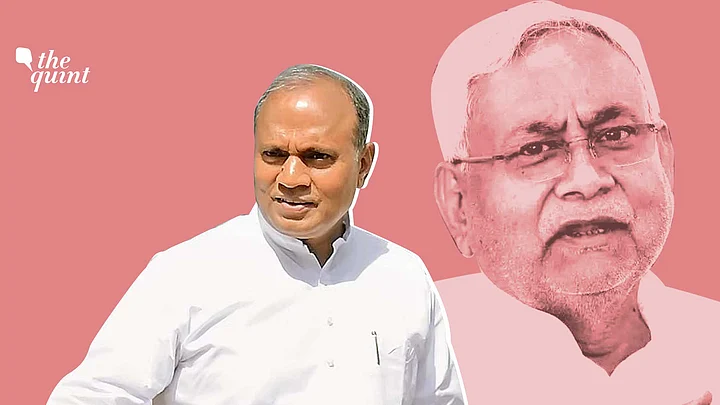A lot is happening in the Janata Dal (United) - from RCP Singh taking over as the new party chief, to the defection of six MLAs in Arunachal Pradesh to the BJP and 'ideological' differences with ally BJP coming to the fore.
The question is that will these pinpricks lead to a major change in its relationship with the BJP? And what does the JD(U) change of guard mean in this context?
First, the pinpricks.
Arunachal Defections and War of Words
Six out of JD(U)'s seven MLAs in Arunachal Pradesh defected to the BJP a few days ago. The JD(U) was the second largest party in the state Assembly after the BJP and is now down to just one MLA.
The JD(U) has said that this goes against "coalition dharma" and reminded the BJP of how things were during the tenure of Atal Bihari Vajpayee. The BJP, on the other hand, claimed that it had no role in the defections and that it couldn't stop MLAs who wanted to join the party voluntarily.
Then the JD(U) through senior leader KC Tyagi took a veiled dig at the BJP by saying that "an atmosphere of hatred is being created in the name of 'Love Jihad" and that it opposes laws prohibiting conversion for marriage.
Another important development was Bihar Chief Minister Nitish Kumar's statement that he "wasn't keen on becoming the CM of Bihar" after the elections held in November this year.
Responding to this, Nitish Kumar's former deputy Sushil Kumar Modi immediately backed Kumar and said that indeed he didn't want to be CM.
Modi's statement is being seen as an attempt to placate the JD(U) following the Arunachal Pradesh defections.
RCP Singh Takes Over as JD(U) President
Meanwhile, former bureaucrat Ramchandra Prasad Singh has taken over as the president of the JD(U) replacing Nitish Kumar. It is an interesting appointment as JD(U) is among the few parties other than the BJP and the Left Parties not to follow dynastic succession.
Singh, 62, is a close confidant of Kumar and the two go a long way back. Like Nitish Kumar, RCP Singh is a Kurmi from Bihar's Nalanda district and he became close to Kumar when the latter was a minister in the Atal Bihar Vajpayee-led NDA government at the Centre and became his private secretary.
Though Singh was IAS officer of the Uttar Pradesh cadre, Nitish Kumar managed to carry out a cadre transfer and bring him to Bihar after he took over as CM in 2005. RCP Singh became Kumar’s principal secretary in Bihar and resigned from the services in 2010, joined the JD(U) and became a Rajya Sabha MP.
Over the years, RCP Singh remained firmly with Kumar through every upheaval in the party - be it Nitish Kumar's decision to leave the NDA in 2013 or go back to it in 2017 and several rebellions from leaders like Sharad Yadav, Jitan Ram Manjhi and Prashant Kishor.
He is also said to enjoy a good working relationship with JD(U)'s ally BJP. RCP Singh is known to have taken on strategist Prashant Kishor, then vice-president of the JD(U), when he advocated a more aggressive stance against the Citizenship Amendment Act.
Singh had always been Nitish's de-facto second in command for the past few years and this position became cemented after Kishor's exit. According to reports, Singh had an important say in most government appointments and transfers.
The Timing
However, the curious part isn't the choice of RCP Singh as Nitish Kumar's replacement but its timing. Why did Kumar choose to do it now?
It is well known that Kumar doesn't like interference in his work but he's increasingly being restricted by an aggressive BJP, which got 31 more seats than the JD(U) in the Assembly elections. A proof of this is the delay in Cabinet expansion, which is said to be because the BJP leadership is busy with other things.
RCP Singh will be saddled with the full time task of keeping an eye on the JD(U)‘s flock and preventing defections of its MLAs in Bihar. Clearly, Kumar was finding it difficult to manage both the government and the party, that too at a time when his own political tenacity has weakened.
RCP Singh was the natural choice as he is known to be thorough and detail-oriented in his style of working and more importantly, knows exactly what Nitish Kumar wants.
He also enjoys a good relationship with top BJP leaders and won't ruffle many feathers in JD(U)'s senior partner.
However, soon after taking over, RCP Singh said that the JD(U) knows how to follow an ally's duty and also prevent being back-stabbed.
Nitish Kumar also wants to focus on expanding the JD(U) outside of Bihar in order to increase his bargaining power vis-a-vis the BJP. The party is likely to contest the upcoming Assembly elections in West Bengal.
While the immediate crisis may have been prevented, the signs aren’t good for the BJP-JD(U) alliance. By stressing that he wasn’t keen to be CM, Kumar may well be warning the BJP that he won’t hesitate in bringing down his own government if he’s pushed to the wall.
(At The Quint, we question everything. Play an active role in shaping our journalism by becoming a member today.)
